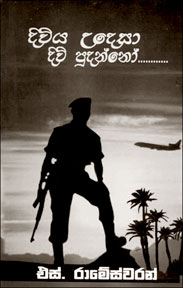|

Focus: Human suffering
Diviya Udesa Divi Pudanno
Translated from Tamil into Sinhala by Sarath
Ananda
Published by S. Godage and Brothers
 'Diviya Udesa Divi Pudanno' is a publication which consists of 11
short stories translated to Sinhala language by Sarath Ananda of
Tissamaharama and written by S. Rameswaran. As the name of the book
suggests, the author portrays with clarity the hardships faced by the
Tamil people during past three decades due to the ongoing war/conflict
in our country. While expounding on the expectations of the younger
generations the author explains the reasons behind unemployed youth
choosing the armed forces. 'Diviya Udesa Divi Pudanno' is a publication which consists of 11
short stories translated to Sinhala language by Sarath Ananda of
Tissamaharama and written by S. Rameswaran. As the name of the book
suggests, the author portrays with clarity the hardships faced by the
Tamil people during past three decades due to the ongoing war/conflict
in our country. While expounding on the expectations of the younger
generations the author explains the reasons behind unemployed youth
choosing the armed forces.
Through the short stories like 'Diviya Udesa Divi Pudanno', 'Mal
Wadamatada Suwanda Atha', 'Urumayada Me' and 'Neethiya Saha Dharmay' he
had been able to reveal perceptively the worries and difficulties faced
by the people in a conflict situation. 'Bhashawa' reveals how ones
ethnicity is harmed through war and conflict. He writes about what are
the shortcomings of human nature and their effects on families and the
society through the 'Nawa Niwasayedi' and 'Gatawara Viye Mathaka'
stories.
The novelty of the collection of short stories written in Tamil
language by the author and translated to the simple Sinhala language
helps the Sinhala readership understand the human suffering due to the
conflict.
Rameswaran who hails from Arthiyady, Point Pedro is attached to
Hector Kobbekaduwa Agrarian Research and Training Institute as
Information and Publication Officer. During 1974 to 1980 he worked as a
Sub Editor at Express Newspapers (Ceylon) Ltd.
- Nadika Damayanthi
Title: Advanced Level Poetry
Author: Hector and Nilusha Alahakoon
Keeping in mind that it is essential to study poetry with a good
understanding of the poet and his thoughts and feelings in the proper
context the authors of this book give a detailed and relevant
description of the poems, prescribed for the Advanced Level syllabus.
Authoritative book on insurance
Title: 'Situation Essays' on Insurance in Sri Lanka
Author: Dr. Wimal Wickramasinghe
Reviewed by Mahanama Prematilaka
On reading this newly published book on insurance in Sri Lanka, I was
amazed how Dr. Wimal Wickramasinghe could write such a comprehensive and
authoritative book on insurance with the details of many and diverse
aspects - a book for all those interested in insurance in Sri Lanka.
This is easily the only book available to the readership with the best
update, given both theoretically and practically.
One noticeable feature of this book is the expression of his candid
and personal views, observations and criticism without upsetting the
trends of thought and also without fear and favour. No other author
would dare to do so! Dr. Wickramasinghe's clout and standing in the
country holding many prestigious positions has given him not only
experience but also courage to air his views freely and forcefully. It
is a rare and bold act.
The subjects dealt with in the book are enormous with 23 chapters
except Introduction and Conclusion. Some of the important ones are
overall insurance, life and general insurance, insurance education,
governance in insurance, microinsurance, reinsurance of general
insurance, bancassurance, study of insurance law, reinsurance of general
insurance, etc. - all related to Sri Lanka but against a comparative
perspective.
The chapter on Takaful or Islamic Insurance in Sri Lanka given
against an international background with all the Islamic terms relevant
to insurance explained should be the only one of its kind, available in
Sri Lanka. A descriptive account given on the insurance business in
India is useful to both Sri Lankan and Indian readers - as author
himself says, it is not found anywhere else in one go.
This is not a book just to be read once and thrown out like a novel
or short story. It is in fact a reference book to be kept by the side of
an insurance practitioner. There are only three textbooks hitherto
available in the market written by two qualified and experienced
insurance experts and they are of course useful to insurance
practitioners and students. But they are limited in coverage and the
number of pages, with no recent developments about the insurance
industry in Sri Lanka given or analyzed. In comparison of the price
charged for these books, the price of the book under review is very
reasonable.
When I saw the first part of the title of the book, 'Situation
Essays' within quotes, I was a bit puzzled but the author has said in
the text that any lively subject like insurance keeps on changing almost
every day and therefore, it is an analysis of insurance as at end
October 2007. But its value from both historical and analytical
standpoints does not diminish at all as it seems to be the only book
that examines a plethora of important subjects of insurance not hitherto
examined by any other author.
The book begins with a comprehensive evaluation of insurance business
against an international perspective followed by life and general
insurance in Sri Lanka and insurance business in India. The role and
functions of many insurance practitioners in the context of Sri Lanka
and elsewhere are sufficiently examined in the text: insurance agents,
insurance companies, brokers, actuaries, marketers, chief executive
officers and directors. Up to now, insurance education has been a
neglected subject but its recent developments towards a university
course, in addition to the one at Wayamba University, are assessed
objectively, giving the author's suggestions for consideration by the
Insurance Board of Sri Lanka.
The most useful feature of the text has been the critical analysis of
the role and functions of the Insurance Board of Sri Lanka, making a
series of proposals for amendment of the Insurance Act as no single
amendment to the Act has been made since its enforcement in 2001. The
author suggests that the amending process should not be done on a
piecemeal basis, as is now proposed by the Insurance Board. There should
be an overhaul of the Act considering the recent changes witnessed in
both Sri Lanka and elsewhere.
Insurance industry is now fully privatized except a part of
compulsory reinsurance of insurance business being recently assigned to
a government body called National Insurance Trust Fund. The critical
views expressed by the author on the sorry state of affairs of the
National Insurance Trust Fund should receive the attention of its
hierarchy and the government.
The reader will notice how fierce insurance competition is,
especially among big wigs. In a way there is no harm in it as it bestows
an array of facilities and benefits to the insured - a welcome sign.
Nevertheless, my personal suggestion is that it should not be allowed to
unethical proportions by the Insurance Board as all advertisements in
both print and electronic media should be referred to the Insurance
Board for prior approval. It is the duty of Chief Executive Officer of
each insurance company to do so, as per a directive given by the
Insurance Board.
The plight into which small insurance companies are placed is
critically examined by the author. To add insult to injury, the
Insurance Board has suggested to the government an increase of paid up
capital of insurance companies to Rs. 500 million for each class of
insurance business as against Re 25 million for life insurance and Rs 50
million for general insurance.
The other proposal the author resists is the proposal for
dispensation of composite insurance business by a single insurance
company, requiring every existing insurance company that does both life
and general insurance business under one roof to segregate one from the
other, resulting in almost doubling of the number of insurance
companies, much cost to the company and the insured.
This seems to be built following of the Indian example, a country
with 1.2 billion population as against 2 million in Sri Lanka and a
country 60 times bigger than Sri Lanka in size. To my knowledge, no
other insurance practitioner or author has argued against these
proposals due to many reasons given by the author. His objection to this
issue is based on the following: there is no insurance company that is
(a) faced with bankruptcy, (b) not reported to be refusing claims on any
noticeable scale, and (c) bolstered in terms of capital by resort to
reinsurance facility of reputed international insurance companies that
assume a larger part of risks. Above all, Sri Lanka is a small country.
It is no doubt a bold exposition of views in a scientific manner.
Issue of corporate governance is a crucial one in business
management. How it is applied to insurance sector is vividly analyzed in
the book against the recent worldwide literature on governance and the
Companies Act of 2007.
Microinsurance is another subject that has amply received attention
in the text with more material from the international scene, a popular
insurance instrument for the poor. His innovative proposals to be
followed by the Insurance Board are worthy of its immediate
consideration. Bancassurance (issue of insurance policies by banks on
behalf of insurance companies) is a fascinating subject that has become
popular on the international insurance scene. This is also gathering
momentum in Sri Lanka with the proposal of allowing corporate entities
too to act as insurance agents - now restricted to individuals only.
This subject is treated comprehensively in four chapters in the book
with definitions, salient features, role of insurance companies, banks
and insurance agents amply explained. There are many other important
subjects dealt with in the book but I shall finally concentrate on the
proposal made by the author for study of insurance law in Sri Lanka, one
of the most fascinating topics treated both comprehensively and
scientifically. As it is, no one has treated this subject. This book is
an update on insurance in Sri Lanka against a theoretical and
comparative background - a book well worth for every insurance
practitioner. It is a worthy reference book, written with a lot of
labour and pain, using new material from the website.
As the author himself says, this book is recommended for all*:*
legislators, insurance administrators, insurance ombudsman, chief
executive officers, actuaries, underwriters, insurance brokers,
marketing and sales force personnel, finance managers and accountants,
all other insurance practitioners and university and other students. |
